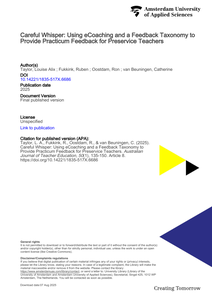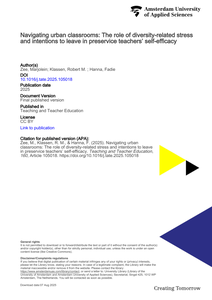Many institutes for initial teacher education struggle to organise effective performance feedback within the context of student teaching practicum. As the cooperating teachers who provide this feedback bring their individualised ontologies, feedback practices have been characterised by inconsistencies in the amount and quality of performance feedback. In this small-scale study carried out in the Netherlands, we explored affordances of eCoaching using a standardised feedback taxonomy. With the help of Bluetooth technology and the Synchronous Online Feedback Taxonomy, four teacher educators provided eCoaching to eight preservice teachers over the course of three lessons. We interviewed teacher educators and preservice teachers about their experiences with eCoaching using the feedback taxonomy during secondary school practicum. Overall, both groups of participants were positive about eCoaching using the taxonomy. Teacher educators observed preservice teachers self-regulating when implementing prior feedback in their lessons. Preservice teachers indicated increased confidence following the lessons with eCoaching.
DOCUMENT

Providing high-quality feedback is essential for improving preservice teacher performance. Rather than post-lesson feedback, immediate performance feedback while teaching is considered effective. This article reports on developing and piloting a standardised tool for synchronous feedback. Eight teacher educators from a Dutch higher education institution were trained to use the tool (based on accepted models of teacher roles, observation criteria and feedback levels) with pre-recorded lessons. Interobserver reliability was good for teacher roles and sufficient for feedback levels. Positive evaluations of the tool and educators’ interest in its application, warrant further research into scalability and effectiveness of synchronous feedback delivery.
DOCUMENT

This three-wave study examined relationships between preservice teachers’ diversity-related stress, teaching self-efficacy (TSE), and intentions to leave the profession. Participants (N = 386) from four Dutch teacher training programs completed surveys on diversity-related stress, intentions to leave, and TSE over 18 months. Random intercept cross-lagged panel models showed that higher diversity-related stress predicted lower TSE and increased intentions to leave. Within-person analyses revealed a complex reciprocal relationship: Highly self-efficacious teachers reported more stress and vice versa. Finally, intentions to leave led to lower TSE at Timepoint 3 only. Findings align with social-cognitive theory, highlighting the interplay between stress, TSE, and career intentions.
DOCUMENT

Present study focuses on revealing and developing personal constructs regarding problem behaviour in classrooms. The main idea is that teachers opinions about their students and themselves influence the way they interact with them. Their thoughts and ideas about students - their personal constructs - are generally unconscious. We used the Personal Construct Theory from Kelly (1955) and his Repertory Grid Technique for exploration mental constructs. They can give an impulse to the development of thinking and acting of teachers. We think it can help them to build up their professional identity towards problem children. Twenty-nine teachers formed the sample that worked with this method. We investigated the number of unique construct pairs mentioned by the teachers. This number happened to be remarkably high. While assessing pupils, the teachers use primarily personality characteristics. There is hardly any agreement between the teachers constructs, which complicates their communication about their pupils. We considered the number of construct pairs named by one participant. This number seems to depend on the type of education the teacher is involved in. The type of the school the teacher is working at also influences the average scores on the constructs. We shall also turn to the issue of pupils sex and its role if any in the teachers scores. No significant differences have been found.
DOCUMENT

In this empirical study, the one-day project Robot Love Design-a-thon was designed for an interdisciplinary group of preservice teachers (in arts, sciences, and primary education), and evaluated through observations and learner reports. An analysis of the observations and the learner reports showed that having to go through a complete design process in a single day worked well: it facilitated the exchange of ideas and critical discussions between students concerning the project’s socially engaged theme ‘Tenderness and Technology’. In addition, interdisciplinary collaboration emerged as an important learning outcome. All students found working in mixed teams a relevant and educational experience as they could profit from each other’s expertise.
DOCUMENT

Although anti-bullying programs often include a component that focuses on strengthening teachers’ abilities in identifying and addressing bullying, it is not clear which bullying situations teachers find difficult to address and what type of support is needed. In the current qualitative study, we investigated what teachers considered difficult bullying situations, how they responded to these situations, and which barriers they encountered. We used data from individual in-depth interviews conducted with 38 Dutch elementary school teachers. Qualitative analysis showed that teachers experienced difficulties in (a) identifying bullying that happens out of sight, (b) estimating the seriousness of a reported incident, (c) addressing persistent aggressive and bullying behavior, and (d) finding solutions with parents to reduce bullying. Teachers used a variety of strategies in their efforts to address these situations. The results give insight into teachers’ needs regarding specific training and support in anti-bullying programs and preservice teacher programs.
DOCUMENT
Significant attention has been paid in the international literature to the effect of in-service training on the interaction skills of teachers in early childhood education and care. The growth of pre-service teachers during teacher education has received relatively little attention to date, however. In a mixed-methods longitudinal study, we monitored the development of interaction skills among a group of Dutch pre-service teachers with repeated measures for 3 years and structured interviews. The results of a linear mixed-effects model revealed an impressive growth of interaction skills during the pre-service training. The qualitative interview data revealed progress of pre-service teachers’ professional reflection on their interaction with young children. These outcomes show the effectiveness of pre-service training for the development of interaction skills and professional reflection in early childhood education and care. However, progress is relatively modest for instructional skills and this domain needs further investment in pre-service training.
DOCUMENT
Online supplements to Smit, E., Tuithof, H., Savelsbergh, E., & Béneker, T. (2023). Geography teachers’ pedagogical content knowledge: A systematic review. Journal of Geography. https://doi.org/10.1080/00221341.2023.2173796 Supplement 1: Extended information on selected studies Supplement 2: Full references of studies used in the review Supplement 3: Codebook Abstract: Pedagogical Content Knowledge (PCK) is the knowledge teachers use to teach a specific subject to a specific audience. The importance of PCK to quality teaching is widely recognized. However, an overview of research about geography teachers’ PCK is missing. To fill this gap, we conducted a systematic review. We analyzed 43 empirical studies, but only 9 used PCK as a framework. Most studies addressed instructional strategies or teaching orientations. The studies were too diverse to draw conclusions on geography teachers’ PCK in general. But portraits of 16 geography teachers emphasized the necessity of geographical knowledge and teaching experience for PCK-quality.
MULTIFILE

Explicit language objectives are included in the Swedish national curriculum for mathematics. The curriculum states that students should be given opportunities to develop the ability to formulate problems, use and analyse mathematical concepts and relationships between concepts, show and follow mathematical reasoning, and use mathematical expressions in discussions. Teachers’ competence forms a crucial link to bring an intended curriculum to a curriculum in action. This article investigates a professional development program, ‘Language in Mathematics’, within a national program for mathematics teachers in Sweden that aims at implementing the national curriculum into practice. Two specific aspects are examined: the selection of theoretical notions on language and mathematics and the choice of activities to relate selected theory to practice. From this examination, research on teacher learning in connection to professional development is proposed, which can contribute to a better understanding of teachers’ interpretation of integrated approaches to language and mathematics across national contexts.
DOCUMENT

Teacher beliefs have been shown to play a major role in shaping educational practice, especially in the area of grammar teaching―an area of language education that teachers have particularly strong views on. Traditional grammar education is regularly criticized for its focus on rules-of-thumb rather than on insights from modern linguistics, and for its focus on lower order thinking. A growing body of literature on grammar teaching promotes the opposite, arguing for more linguistic conceptual knowledge and reflective or higher order thinking in grammar pedagogy. In the Netherlands, this discussion plays an important role in the national development of a new curriculum. This study explores current Dutch teachers’ beliefs on the use of modern linguistic concepts and reflective judgment in grammar teaching. To this end, we conducted a questionnaire among 110 Dutch language teachers from secondary education and analyzed contemporary school textbooks likely to reflect existing teachers’ beliefs. Results indicate that teachers generally appear to favor stimulating reflective judgement in grammar teaching, although implementing activities aimed at fostering reflective thinking seems to be difficult for two reasons: (1) existing textbooks fail to implement sufficient concepts from modern linguistics, nor do they stimulate reflective thinking; (2) teachers lack sufficient conceptual knowledge from linguistics necessary to adequately address reflective thinking.
DOCUMENT
